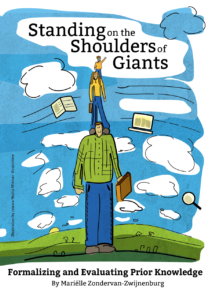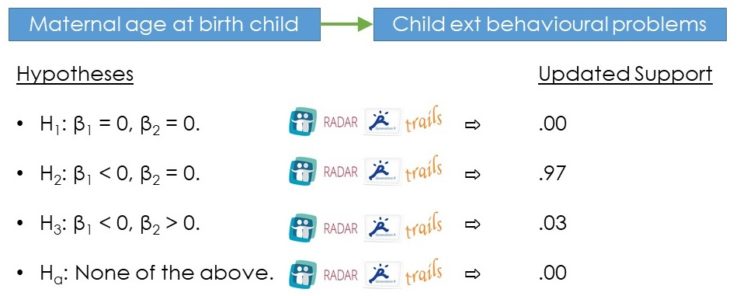Agenda
PhD defence Mariëlle Zondervan-Zwijnenburg
Standing on the Shoulders of Giants: Formalizing and Evaluating Prior Knowledge
Friday 4 October 2019 Mariëlle Zondervan-Zwijnenburg (UU, WP4) defends her PhD dissertation.
The dwarf sees farther than the giant, when he has the giant’s shoulder to mount on.
Samuel Taylor Coleridge
 We can learn more about the truth by building on previous discoveries. Mariëlle’s dissertation is about building on and evaluating the worth of previous discoveries. Two ways to include previous discoveries in statistical analyses are informative priors and informative hypotheses. In three parts, Mariëlle’s dissertation aims to demonstrate how prior knowledge can be formalized and evaluated.
We can learn more about the truth by building on previous discoveries. Mariëlle’s dissertation is about building on and evaluating the worth of previous discoveries. Two ways to include previous discoveries in statistical analyses are informative priors and informative hypotheses. In three parts, Mariëlle’s dissertation aims to demonstrate how prior knowledge can be formalized and evaluated.
1. Acquiring prior knowledge for Bayesian analyses
Mariëlle shows that prior information can be very useful (promote convergence, coverage, correct estimates, and statistical power), but can take substantial effort to obtain (doi: 10.1027/1614-2241/a000162). Therefore, she provides guidelines for researchers that want to include informative priors in their analyses (doi: 10.1080/15427609.2017.1370966 ). She also developed and evaluated an expert elicitation procedure (doi: 10.3389/fpsyg.2017.00090).
2. Testing replication by means of the prior predictive p-value
The prior predictive p-value tests whether a new study fails to replicate relevant findings of an original study. It takes into account that parameter estimates and samples based on these estimates vary naturally. An R Shiny user-interface, and two R-packages were developed to make the prior predictive p-value accessible to social and behavioural scientists.
3. Practical application: cross-validating and synthesizing information from multiple cohort studies
Exploratory results were used to compose informative hypotheses that were evaluated in four cohort studies using Bayes factor (doi: 10.1111/cdev.13267). The confirmatory analyses resulted in a posterior model probability for each of the competing informative hypotheses. Afterwards, the relative probabilities were combined over the four cohorts to evaluate which hypotheses were best supported by all cohorts.
Mariëlle is currently a CID postdoc. She recently described how her postdoc focuses on the Bayesian research synthesis method to combine cohort studies.
 Updated evidence for one of the confirmatory phase analyses, here the evidence indicated that maternal age most likely has a negative association with behavioural problems. Figure designed by Mariëlle Zondervan-Zwijnenburg.
Updated evidence for one of the confirmatory phase analyses, here the evidence indicated that maternal age most likely has a negative association with behavioural problems. Figure designed by Mariëlle Zondervan-Zwijnenburg.
Reference
Zondervan-Zwijnenburg M. (2019) Standing on the Shoulders of Giants: Formalizing and Evaluating Prior Knowledge.
Persistent identifier URN:NBN:NL:UI:10-1874-383981
List of CID PhD dissertations:
